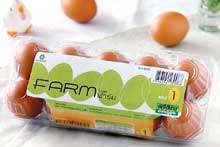Betagro aims new hygienic eggs at Japanese residents

Thai food producer Betagro is finding its niche in offering hygienic eggs fit for a typical Japanese meal – a raw egg on a bowl of rice.
Farm brand eggs are Betagro’s mainstream product line, with sales of 1.5 million eggs a day, compared with about 50,000 the company expects to sell under its high-end hygienic line.
Premium-grade chicken eggs to be launched this month by the Betagro Group will be targeted at Japanese residents of Thailand, the food service sector and consumers who can afford to pay seven to nine baht for an egg, or about three times the price of a normal product.
The hygienic eggs will come from “biosecurity farms” where hen layers are fed no chemical feed or additives.
Importantly, eggs will be cleaned and delivered to customers under temperature-controlled conditions of not less than 8 degrees Celsius all along the supply chain to assure quality is maintained, said Nopporn Vayuchote, the group executive vice-president.
Grading equipment has been installed at a distribution and packing unit in Talaad Thai, a central agricultural market in Pathum Thani, to screen out eggs that have small cracks in the shell or red spots on the yolk or the egg white.
Betagro plans to supply about 50,000 hygienic eggs to market each day under the S-Pure brand and the lower-grade HyEgg brand.
The volume is small compared with its overall egg business, with 1.5 million eggs distributed under the Farm brand each day, and represents only a tiny portion of the country’s overall market of 27-28 million a day.
Mr Nopporn is confident that expected uncertainty in the local egg market, with the government planning to open up imports of layer parent stock, will not affect this product line.”It may be a very small market, but we want to target this product at specific segments – food service in five-star hotels and the more than 50,000 Japanese living in Thailand,” he said.













